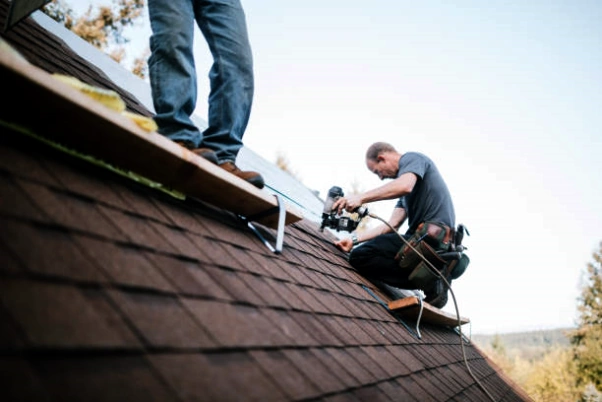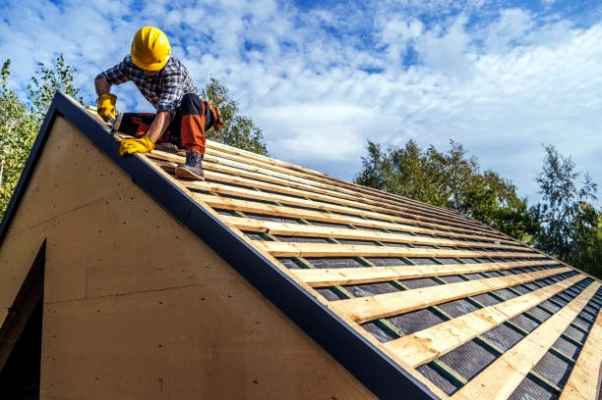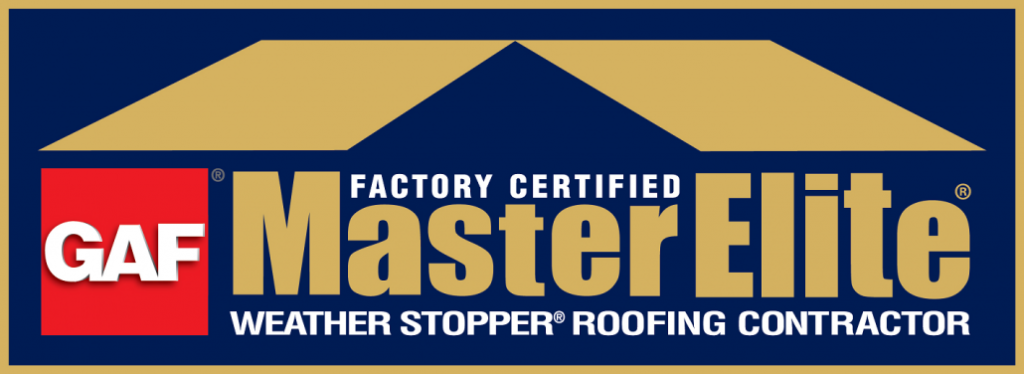Understanding roof warranties can be intimidating for any homeowner wanting to protect their investment. Knowing which warranty suits your needs—whether it’s a standard manufacturer warranty covering roofing materials or a more comprehensive option that includes installation issues—is crucial for peace of mind.
When considering roof warranties, it’s crucial to understand the length of coverage, what events or damages are covered (such as leaks, wind damage, etc.), any exclusions or limitations, transferability if you sell your home, and the process of filing a warranty claim. Familiarizing yourself with these elements will ensure that you make an informed decision when selecting roofing products and warranties for your home.
We’ve dug deep into the nuances of roof warranties to provide you with clear, reliable information. You’ll discover various types of coverage—from basic material defects to complex concerns like improper installation—and learn about the potential benefits of extended options. This guide will walk you through everything you need to know to make an informed decision, ensuring your new roof is well-protected and free from unexpected costs.
Types of Roof Warranties
When purchasing a new roofing system, it is critical to understand the various warranty options available to safeguard your investment. Let’s dive into the three primary categories:
Standard Manufacturer Warranties
Manufacturer warranties are a fundamental layer of protection for roofing materials. They cover defects that may occur due to manufacturing errors and typically last anywhere from 20-50 years. For example, if your shingles begin to crack or blister within the warranty period due to a manufacturing defect, they will typically be replaced at no cost to you. These warranties offer homeowners peace of mind, ensuring that any faults due to material issues will be rectified without additional financial burden. However, it’s important to review the terms and conditions, as some warranties may become void if specific installation guidelines aren’t followed.
Workmanship Warranties
In addition to manufacturer coverage, roofing contractors provide workmanship warranties. These warranties cover installation-related issues that are not covered by the manufacturer’s standard warranty. If a leak occurs because of improper installation within a specified period (typically ranging from 5-10 years), the contractor is responsible for repairing it at no cost to the homeowner. Workmanship warranties serve as an assurance that your roofing system has been installed correctly, with a reputable contractor standing behind their work to promptly address and resolve any issues resulting from faulty installation.
Extended Manufacturer Warranties
Extended manufacturer warranties are premium options that encompass coverage for both materials and installation over an extended period. While these warranties come at an additional cost, they offer comprehensive protection for homeowners. In addition to covering defects in materials and workmanship, they often include extras such as tear-off and disposal of defective shingles. With extended manufacturer warranties, homeowners gain full peace of mind and heightened protection against potential roofing issues. These enhanced warranty packages serve as an investment in long-term security and protection for your home’s roofing system.
At Thompson Roofing & Construction, we recognize the significance of offering extensive warranty options to ensure full peace of mind for our valued customers. Our range of warranty choices aims to provide comprehensive coverage, protecting both roofing materials and installation work.
Manufacturer vs. Contractor Warranties
There are significant differences between manufacturer and contractor warranties. Let’s discuss the differences:
Manufacturer Warranties
Manufacturer warranties cover the roofing materials themselves, safeguarding against factory defects and often allowing transfer to new homeowners if the property is sold. This warranty type acts as a pledge from the manufacturer that their materials are high quality and free from defects.
These warranties can vary in duration and typically provide long-term coverage, ranging from 20 to 50 years, and sometimes even a lifetime. The extended coverage reflects the manufacturer’s confidence in the durability and reliability of their products. It’s a promise that the roofing materials will stand the test of time without compromising quality.
Contractor Warranties
In contrast to manufacturer warranties, contractor warranties cover the quality of the installation work rather than the materials themselves. The duration of these warranties can vary significantly depending on the contractor, making it essential to choose a reputable company like Thompson Roofing and Construction that stands behind its work. Typically, contractor warranties last for up to 10 years, ensuring that any issues arising from the installation are addressed during this period.
The significance of contractor warranties lies in their ability to assure workmanship, especially regarding proper installation. This is crucial because even high-quality materials won’t perform optimally if they’re not installed correctly. A comprehensive understanding of how well a contractor’s work is guaranteed should be an essential factor when choosing a roofing professional.
Combined Benefits
Some contractors offer warranties that combine material and workmanship coverage, providing clients with an even more comprehensive safety net. By combining these two aspects, homeowners can benefit from enhanced protection that covers both material defects and installation issues.
This approach eliminates potential conflicts between manufacturer and contractor responsibilities by consolidating both aspects under one comprehensive warranty. It ensures peace of mind regarding both product quality and correct installation practices for an extended period.
Coverage Limits and Duration
When it comes to roof warranties, it is essential to understand their coverage limits, duration, and the types of damages they encompass. Understanding these details can save homeowners from unexpected expenses and provide peace of mind about the longevity of their roofs.
Coverage Scope
The scope of coverage varies among different roof warranties. For example, certain standard warranties may exclude damage caused by storms or leaks resulting from improper roof maintenance. It’s vital for homeowners to carefully review the terms and conditions to comprehend what exactly is covered under the warranty terms.
Imagine if a severe storm hits your area, causing extensive damage to your roof. If your warranty does not include storm damage, you could be left with significant repair costs. By knowing the scope of coverage beforehand, homeowners can make informed decisions about additional insurance or taking extra precautions to protect their roofs during harsh weather conditions.
Duration
Manufacturer warranties commonly range from 20 to 50 years, primarily covering material defects. On the other hand, contractor warranties typically span between 1 and 10 years, focusing on workmanship. Understanding the length of coverage is crucial, as it directly impacts how long the homeowner can rely on protection against potential issues that may arise.
Full vs. Prorated Coverage
It’s essential to differentiate between full and prorated coverage when examining roof warranties. In full coverage, the manufacturer or contractor covers 100% of repair or replacement costs for a specific duration specified in the warranty. Conversely, prorated coverage reduces the payout based on the age of the roof.
Consider a scenario where a roof requires repair due to a material defect six years after installation. Under a full coverage warranty, all repair costs would typically be paid by the manufacturer or contractor. However, with a prorated warranty for the same issue after six years, there would likely be reduced compensation due to the age of the roof.
To ensure clarity about coverage and duration terms in roof warranties, homeowners should carefully read and understand all clauses mentioned in both manufacturer and contractor agreements to be knowledgeable about their level of protection.

Claiming Warranty for Damage
Filing a warranty claim might seem like a daunting task, but it doesn’t have to be overwhelming if you follow these steps. First and foremost, before anything else, understand your warranty terms. Each warranty has specific coverage and limitations, so it’s crucial to comprehend what exactly is covered under yours.
Step 1 – Review Your Warranty Terms
Before taking another step towards making a claim, familiarize yourself with what your warranty covers. This interpretation sets the stage for detailed expectations and saves you from future frustration if the damage isn’t eligible for coverage. Preparedness through understanding the details of your warranty can prevent unwelcome surprises.
Step 2 – Document the Damage
Once you’ve reviewed your warranty terms and confirmed that your damages fall within the covered range, promptly document the harm. Detailed documentation serves as concrete evidence down the line in case there are doubts or questions about the issue.
Step 3 – Contact the Warranty Provider
Upon compiling solid evidence, reach out to your warranty provider (which could be either the manufacturer or contractor based on your warranty type). Once contacted, they’ll likely send an inspector to assess the damages firsthand.
Step 4 – Follow Up
Following through after making the initial contact is paramount. Promptly respond to any questions or requests for further information concerning your claim. Effective communication with your warranty provider expedites claim processing and subsequent repair work while curbing opportunities for further property damage.
Understanding how to properly file a warranty claim can make all the difference in expediently addressing damages without additional stress or complications. With these steps in mind, navigating through processing can be a streamlined experience that ensures quick repairs while maximizing coverage benefits in times of need.
Cost Analysis of Roof Warranties
When it comes to selecting a new roof, a considerable monetary investment is required. It’s pivotal to not only weigh the costs of the shingles and installation but also consider the warranty expenses associated with different coverage options. Standard warranties typically come bundled with the cost of roofing materials, meaning you won’t have to pay extra for basic coverage.
Extended warranties provide additional layers of security and peace of mind by covering a wide array of potential issues that may arise over time. Thus, it’s essential to consider the potential long-term savings—spending more upfront on a high-quality warranty could save thousands in future repair costs.
In essence, while it might seem like an additional expense at first, investing in an extended warranty gives you substantial peace of mind against expensive, unforeseen repairs down the line.
Before making any decisions about warranties, it is important to assess your specific situation and prioritize what matters most to you. Investigate thoroughly and consult with experts if needed, as nailing down these intricacies will prove invaluable when making such pivotal investments.
In summary, analyzing the costs associated with roof warranties is vital to understanding their true value. While standard warranties are generally included in the purchase price of roofing materials, carefully evaluating extended warranty options allows homeowners to make informed decisions that align with their long-term savings goals.
Key Features to Consider in a Warranty
When it comes to assessing the value of a warranty, some key features should sit at the top of your checklist. These features can significantly impact ensuring that your investment in a roof warranty provides tangible value.
Transferability
Imagine selling your home and being able to assure potential buyers of a transferable roof warranty. It not only adds real, tangible value to your property but also serves as an attractive selling point. This feature offers peace of mind and security for both you, as the current homeowner, and any prospective buyer.
Exclusions
Every contract has exclusions. Understanding what isn’t covered under your roof warranty is just as important as knowing what is covered. Natural disasters or improper maintenance are common exclusions, so knowing these beforehand helps you understand the risks you need to manage on your own. It’s all about transparency and managing expectations; knowing exactly what isn’t covered helps you plan accordingly and take necessary preventive measures.
Additional Services
Some warranties offer added benefits such as annual inspections, discounted repair services, or other supplemental provisions. These additional services can be incredibly valuable in helping you maintain the integrity and longevity of your roof. For instance, comprehensive warranties may include routine inspections to ensure that your roof remains in optimal condition throughout its lifespan.Understanding roofing warranties is pivotal to safeguarding your home, making informed decisions about its maintenance, and ensuring peace of mind. If you are looking for expert advice on roofing warranties or require assistance with any roofing needs, do not hesitate to reach out to Thompson Roofing and Construction. Our team will provide personalized assistance while prioritizing quality workmanship to keep your home safe and secure.







